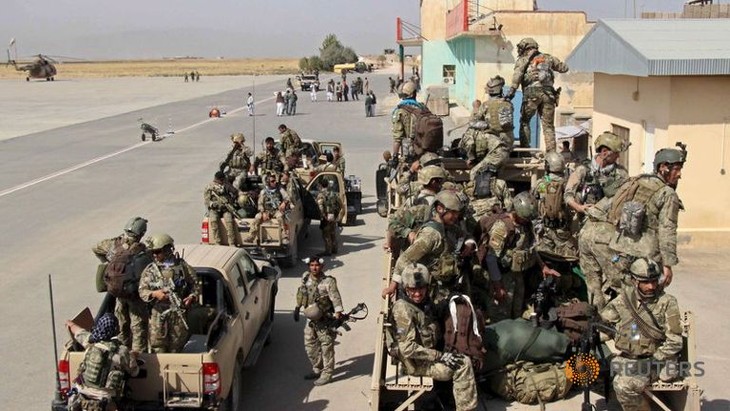(VOVworld) – 14 years after US President George W. Bush launched a war on terrorism in Afghanistan (October 7, 2001), stability in Afghanistan remains elusive.
 |
| Afghan special forces arrive for a battle with the Taliban in Kunduz city, northern Afghanistan, September 29, 2015. (photo: REUTERS/Stringer) |
Instability in Afghanistan has depressed the economy while the Taliban has grown stronger and there is a growing number of Islamic State (IS) supporters.
Continuing conflicts
Since January 1, 2015, when the Afghan National Security Forces took over security responsibilities from NATO, fighting has continued across the country. The situation refutes the US military’s claim of having eliminated the Al-Qaeda network in Afghanistan and Pakistan and having built an Afghan military capable of defending their country.
Security has deteriorated. Taliban rebels have carried out frequent attacks on civilians and the government security force. Although President Asraf Ghani has repeatedly called on the Taliban to negotiate or participate in the national political process, the Taliban has not accepted. Taliban leaders say they will not participate in peace negotiations until foreign troops leave Afghanistan.
The Taliban have overrun the northern Afghan city of Kunduz, although the government has had as many as 7,000 troops in the area. This suggests that the government lacks the strength to resolve Afghanistan’s problems.
The number of individuals and groups vowing loyalty to IS has increased in many provinces of Afghanistan. The UN reports that approximately 10% of all Taliban forces are pro-IS. The Afghan government has discovered a number of groups using IS symbols or supporting IS in 25 of 34 provinces in Afghanistan.
A rift has appeared in the Afghan government. The opposition has referred to the possibility of using the Constitution to oust the President and hold a snap election. Most recently, the Parliament rejected the nomination of Masoom Stanekzai as Defense Minister, blocking President Asraf Ghani’s attempt to establish a cabinet after 9 months in power.
Economic downturn, widespread poverty
There has been an influx of migrants from Asia and Africa into Europe. 36% of the migrants are from Afghanistan, just 2% less than Syria. Worth noting is that most of the migrants from Afghanistan are young and are seeking a better life in Europe. They fled Afghanistan for both security and economic reasons. Over the last decade, Afghanistan has failed to create a viable economy. Afghanistan’s economy is in a serious recession, partly due to reduced foreign aid and fewer construction and logistical services contracts. Youth unemployment keeps rising.
Approximately 80% of the population in Kabul live in temporary settlements that lack clean water and sanitation. 9 million people, roughly 30% of Afghanistan’s population, live below the poverty line, about 1 USD per day. Two thirds of Afghan adults are illiterate, 15% higher than the average level of the world’s least developed countries. The UN reports that the area under poppy cultivation in Afghanistan in 2014 was of record size. Drug trafficking benefits the Taliban and other rebel groups and increases corruption and crime.
14 years after the war on terror was launched there, Afghanistan is still struggling with political, economic, and social instability. There is yet no sign of peace or a better life in Afghanistan.